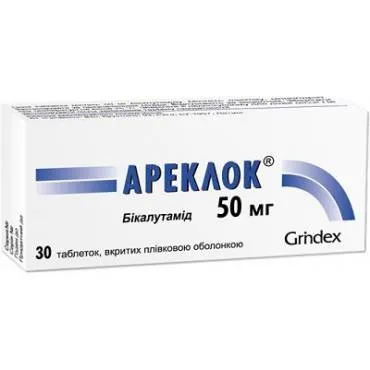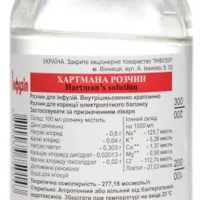Description
Areclok (Bicalutamide) Coated Tablets 50 mg. №30
Ingredients
Active ingredient: Bicalutamide 50 mg.
Other ingredients: lactose monohydrate, povidone, sodium starch glycolate, magnesium stearate, hypromellose, macrogol, titanium dioxide, talc.
Dosage
Recommended dosage: The usual dose is one 50 mg tablet taken once daily with or without food. Follow your doctor’s instructions.
Indications
Areclok tablets are indicated for the treatment of prostate cancer either alone or in combination with other treatments.
Contraindications
Do not take Areclok tablets if you are allergic to bicalutamide or any other ingredients in the product. Consult your doctor before use if you have liver problems.
Directions
Take Areclok tablets exactly as prescribed by your healthcare provider. Do not exceed the recommended dose or change the dosing schedule without consulting your doctor.
Scientific Evidence
Bicalutamide, the active ingredient in Areclok tablets, has been extensively studied for its efficacy in the treatment of prostate cancer. Research published in the Journal of Clinical Oncology has shown that bicalutamide, when used in combination with a luteinizing hormone-releasing hormone (LHRH) analog, significantly improves overall survival in patients with advanced prostate cancer.
Additional Information
It is important to attend regular follow-up appointments with your healthcare provider while taking Areclok tablets to monitor your response to treatment and any potential side effects. Inform your doctor of any new symptoms or changes in your health.
Pharmacological Effects
Bicalutamide, the active ingredient in Areclok tablets, is a nonsteroidal antiandrogen that competitively inhibits the action of androgens like testosterone in the body. By blocking the androgen receptors in prostate cancer cells, bicalutamide slows down tumor growth and can lead to tumor regression. This mechanism of action makes it an important component in the treatment of prostate cancer.
Clinical Trials and Comparative Effectiveness
Clinical trials have demonstrated the efficacy of bicalutamide in improving overall survival and quality of life in patients with prostate cancer. In comparative studies, bicalutamide has shown similar effectiveness to other antiandrogen medications but with potentially fewer side effects, making it a preferred choice for many patients.
References:
- McLeod DG. Bicalutamide: clinical pharmacokinetics and metabolism. Clin Pharmacokinet. 2004;43(13):855-878.
- Wirth MP, Hakenberg OW, Froehner M. Antiandrogens in the treatment of prostate cancer. Eur Urol. 2007;51(2):306-314.





